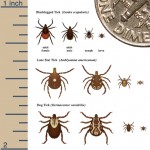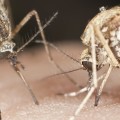
Ticks Causing Strange Red-Meat Allergy
Georgette Simmons, a 71 year old woman from Tennessee, helped celebrate her friend’s birthday at a steakhouse. She woke up around 4:30am covered in hives, describing her skin as feeling as if it was on fire. She ordered another steak while celebrating her brother’s birthday several weeks later. Hours after eating the steak, she woke up with hives, the burning sensation, and with a constricted throat. Soon after, Dr. Robert Valet at Vanderbilt University diagnosed Simmons with a red meat allergy.
The allergy is caused by a sugar called “alpha-gal,” and is found in all mammals except for primates (including humans). Normally, when a person eats an animal containing the alpha-gal sugar, it is processed through the human body without an issue. When injected into the bloodstream by a tick, however, an allergic reaction can occur. Afterwards, the allergic reaction occurs whenever the body comes in contact with alpha-gal (including alpha-gal ingested via the meat of nearly any mammal).
This allergy is strange for a couple of reasons. If diagnosed, it is sometimes mistaken for pork-cat syndrome in which patients are allergic to a protein that is found in both cats as well as in pork. Pork-cat syndrome is widely misunderstood and understudied. Some doctors believe meat from any non-primate mammal has potential to trigger a reaction in a patient with the syndrome, as the protein is shared between all non-primate mammals. In the alpha-gal allergy, the allergen is a carbohydrate (a sugar) as opposed to a protein. Another odd quality is that the allergic response may occur up to 8 hours (though 4-6 hours is most common) after ingestion as opposed to nearly-immediately.
- a man suffering from alpha-gal allergy
- tick sizing comparison via the CDC
- a map of the lone star tick’s habitat
In 2007, Sheryl van Nunen published the first paper on the tick-allergy connection. Prior to this publication, Thomas Platts-Mills and Scot Commins were trying to figure out why some patients were developing symptoms similar to allergic reactions from a carbohydrate in a drug for treating cancer. They previously thought a parasite or even a fungal infection could be the cause of the allergy. Platts-Mills was later bitten by a tick, developed the alpha-gal allergy, and came to the conclusion that the allergy was possibly caused by tick bites. Their paper linking the allergy to tick bites was published in 2011.
The duration of the allergy after the initial tick bite is unknown. Some scientists have hypothesized that it’s permanent, but tests showing declining antibodies over time signify that the reaction will most likely disappear after a period of 8-months to 5-years. Additional tick bites between this period will cause antibodies to rise, potentially increasing the duration of the allergy. The tick of greatest concern within the US in regards to alpha-gal allergy is the lonestar tick. Scientists are rather certain that other ticks within the US cause the meat allergy, but the exact species are unknown due to insufficient studies.
Blood tests indicating the alpha-gal allergy have not yet been approved by the FDA, but they are available for use if paid for by private individuals. No cure currently exists. The best way to prevent alpha-gal allergy is to prevent tick bites. To learn more about protecting yourself from ticks, preventing tick bites yourself, or who to contact to eradicate a tick population, visit http://www.mosquitosquad.com/bugs-disease/ticks/













